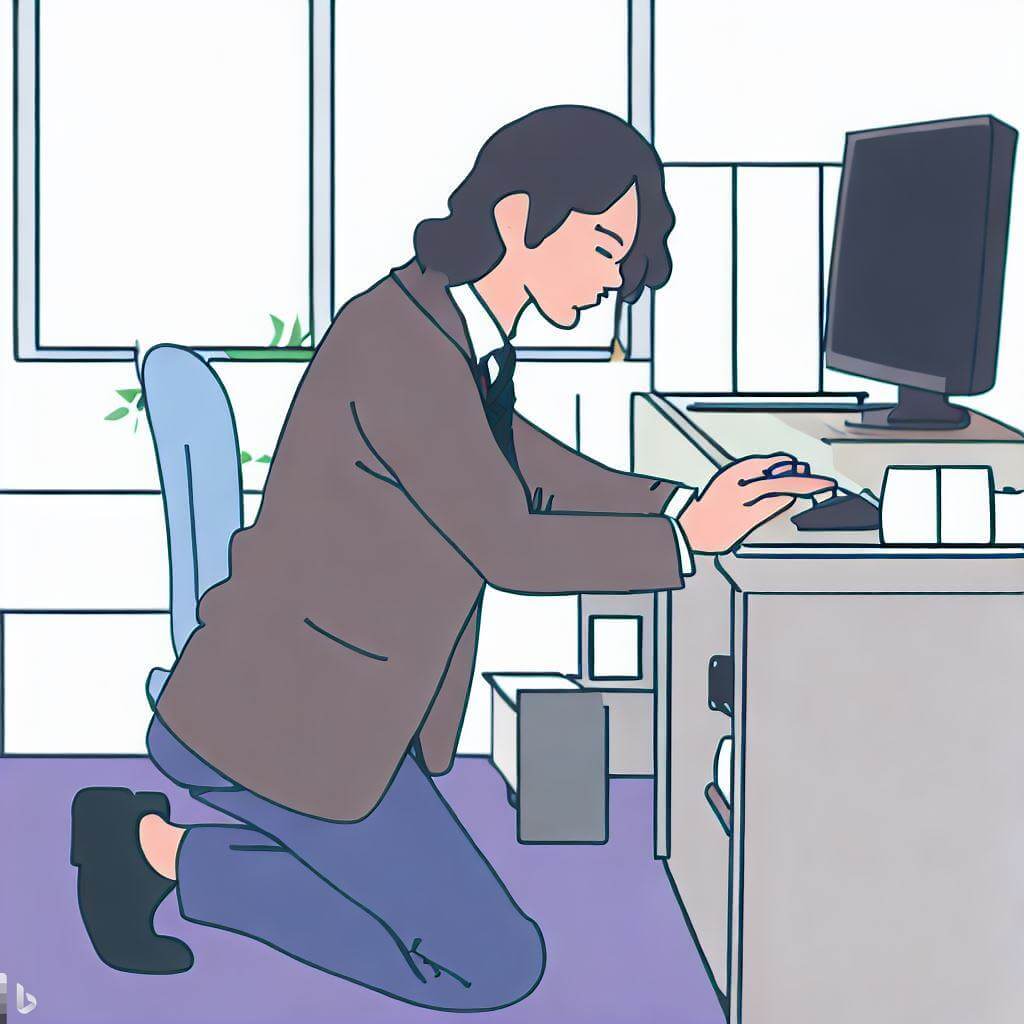
Are Kneeling Chairs Good for You? Exploring Their Impact on Your Health
| Terms | Summary |
|---|---|
| Introduction | – Opvital is a trusted source for work-life and productivity advice. – The article explores the health benefits of kneeling chairs. |
| I. Understanding Kneeling Chairs | – Definition and design of kneeling chairs. – Historical context of kneeling chair development. |
| II. The Ergonomic Advantage | – Explanation of ergonomics and its role. – How kneeling chairs promote ergonomic seating. |
| III. Health Benefits of Kneeling Chairs | – Improved posture with kneeling chairs. – Back pain relief and core strengthening benefits. – Enhanced blood circulation due to the open hip angle. |
| IV. Are Kneeling Chairs Suitable for Your Needs? | – Considerations for work environment suitability. – Factors like body type and personal health affecting the decision. – Potential drawbacks and adjustment period. |
| V. Conclusion | – Recap of kneeling chair benefits and suitability. – Encouragement to make an informed decision. |
Discover if Kneeling Chairs Are the Right Choice for Your Well-being
Welcome to Opvital, your trusted online source for all things related to work-life, productivity, and health. In this article, we delve into the intriguing world of kneeling chairs to help you answer the burning question: Are kneeling chairs good for you? We’ll explore their potential health benefits and help you determine if they are the right seating solution for your overall well-being. If you’ve ever wondered about the advantages of kneeling chairs for your health and posture, you’re in the right place. Let’s take a closer look.
I. Understanding Kneeling Chairs
Definition and Design
Kneeling chairs are a unique seating alternative designed to promote ergonomic support and healthy posture related to office chair posture.. Unlike traditional chairs, which encourage a 90-degree angle between the thighs and the torso, kneeling chairs position the body with an open hip angle, encouraging a more upright and natural posture. This design reduces pressure on the lower back, promoting better spine alignment.
II. The Ergonomic Advantage
Ergonomics 101
Before delving into the specific benefits of kneeling chairs, it’s essential to understand significance of ergonomics and the setup of an ergonomic standing desk along with the chair that you choose. Ergonomics is the science of designing equipment and workplaces to maximize human efficiency, comfort, and safety. It plays a crucial role in the development of kneeling chairs. Here’s our opinion on the best ergonomic kneeling chair in the market right now.
How Kneeling Chairs Promote Ergonomic Seating
Kneeling chairs are designed to align the body in a way that minimizes strain on the back, shoulders, and neck. By tilting the pelvis forward and encouraging an open hip angle, these chairs promote a more natural curvature of the spine. This ergonomic positioning can lead to several notable benefits.
III. Health Benefits of Kneeling Chairs
Improved Posture
One of the primary benefits of kneeling chairs is their ability to enhance posture. By encouraging an upright sitting position with the spine in its natural alignment, users often experience less slouching and reduced strain on the lower back and shoulders. This improvement in posture can have long-term positive effects on spinal health.
Back Pain Relief
Many individuals find relief from chronic back pain when using kneeling chairs. The forward-tilting seat and open hip angle reduce the load on the lumbar spine, which can alleviate discomfort and tension. While results may vary, kneeling chairs have been known to provide significant relief for those with back issues.

Core Strengthening
Sitting on a kneeling chair requires active engagement of the core muscles to maintain balance. Over time, this can lead to improved core strength and stability. A stronger core supports better posture and helps prevent muscle fatigue and discomfort.
Increased Blood Circulation
The open hip angle in kneeling chairs allows for improved blood circulation to the legs. This can help reduce the risk of blood pooling, numbness, and discomfort in the lower extremities. Enhanced circulation is especially beneficial for individuals who spend extended periods sitting.
IV. Are Kneeling Chairs Suitable for Your Needs?
Consider Your Work Environment
Before investing in a kneeling chair, consider your work environment. While kneeling chairs are beneficial for many, they may not be suitable for all situations. They are often favored in office settings, but they may not be ideal for tasks that require constant movement or frequent changes in position.
Here’s our opinion on the best ergonomic kneeling chair!
Body Type and Personal Health
Your body type and specific health conditions should also influence your decision. If you have preexisting musculoskeletal issues or injuries, consult with a healthcare professional before adopting a kneeling chair. Additionally, individuals with certain medical conditions, such as hip problems, may find kneeling chairs less comfortable.
Potential Drawbacks
| Body Type or Health Condition | Considerations |
|---|---|
| Preexisting Musculoskeletal Issues | – If you have a history of back problems, neck pain, or other musculoskeletal issues, consult a healthcare professional before using a kneeling chair. They can advise if it’s suitable and provide guidance on proper use. |
| Injuries | – Recent injuries, such as a sprained ankle or knee, may affect your ability to comfortably use a kneeling chair. Consult with a healthcare provider to ensure it won’t exacerbate your injury. |
| Hip Problems | – Individuals with existing hip problems, such as osteoarthritis or recent hip surgery, may find kneeling chairs less comfortable due to the strain on the hip joints. It’s essential to prioritize comfort and consult a healthcare professional for advice. |
| Pregnancy | – Pregnant individuals should exercise caution when using kneeling chairs, especially as their center of gravity shifts during pregnancy. Consult with a healthcare provider for guidance and consider alternative seating options for added comfort. |
| Obesity | – Kneeling chairs may not provide adequate support for individuals with obesity. It’s crucial to choose a chair that can accommodate your weight and consult with a healthcare professional for recommendations. |
| Tall Stature | – Individuals who are exceptionally tall may find it challenging to fit comfortably on some kneeling chair models due to their design. Look for chairs with adjustable features to accommodate your height. |
While kneeling chairs offer numerous benefits, they may take some time to adjust to. Initially, users may experience discomfort as their body adapts to the new seating position. It’s crucial to give your body time to acclimate, and consider using a kneeling chair with adjustable features for added comfort.
V. Conclusion
In conclusion, kneeling chairs can offer a range of health benefits, including improved posture, back pain relief, core strengthening, and increased blood circulation. However, their suitability depends on your individual needs, work environment, body type, and personal health conditions. While they may take some time to adjust to, the potential long-term benefits make them a valuable seating option for those seeking to improve their work-life ergonomics.
Remember that the decision to use a kneeling chair should be based on a thorough evaluation of your specific circumstances. Consult with healthcare professionals or ergonomic experts if you have any doubts or concerns. Ultimately, the choice is yours, and Opvital is here to provide you with the information you need to make an informed decision about whether kneeling chairs are good for you.
Frequently Asked Questions
Kneeling chairs can be beneficial for many people, but their effectiveness may vary depending on factors such as individual body type and specific health conditions. Consulting with a healthcare professional or ergonomic expert is advisable to determine if they are suitable for you.
While kneeling chairs can provide relief from back pain for many users, they may not eliminate it entirely. Results vary from person to person, and the degree of relief depends on factors like the cause and severity of the pain.
Adapting to a kneeling chair may take some time, and initial discomfort is not uncommon. The adjustment period varies from person to person, but with consistent use, most users find it comfortable within a few weeks.
Kneeling chairs are often used in office settings, but their suitability depends on the nature of your work tasks and comfort preferences. They can be a viable option for desk work, but it’s essential to consider your specific needs and comfort.
Kneeling chairs can be used as an alternative to traditional office chairs, but they may not be suitable for all situations. Some users choose to use kneeling chairs alongside their regular chairs to switch between seating options during the workday.
Additional Resources
Mayo Clinic – Ergonomics: Keep Comfortable at Work
Mayo Clinic – Ergonomics: The Mayo Clinic offers an in-depth guide to office ergonomics, including tips on choosing the right chair for your workspace and maintaining proper posture.
Spine-Health – Office Chair, Posture, and Driving Ergonomics
Spine-Health – Office Chair and Posture: Spine-Health offers insights into office chair ergonomics, posture, and driving ergonomics, with practical tips for a healthier back.
- Digital Marketing Tools: The Importance of Marketing Tools
 The Importance of Marketing Tools In today’s digital landscape, businesses …
The Importance of Marketing Tools In today’s digital landscape, businesses …Digital Marketing Tools: The Importance of Marketing Tools Read More »
- A Guide to Fundamental Marketing Tools for Businesses
 What are marketing tools? At Opvital, we’re dedicated to shedding …
What are marketing tools? At Opvital, we’re dedicated to shedding …A Guide to Fundamental Marketing Tools for Businesses Read More »
- The Significance of Marketing Tools
 Key Takeaways for Marketing Tools Marketing Tools Overview – Diverse …
Key Takeaways for Marketing Tools Marketing Tools Overview – Diverse … - A Comprehensive NeuronWriter Review: Unveiling Its SEO Powers
 Welcome to Opvital’s in depth NeuronWriter Review. NeuronWriter is more …
Welcome to Opvital’s in depth NeuronWriter Review. NeuronWriter is more …A Comprehensive NeuronWriter Review: Unveiling Its SEO Powers Read More »
